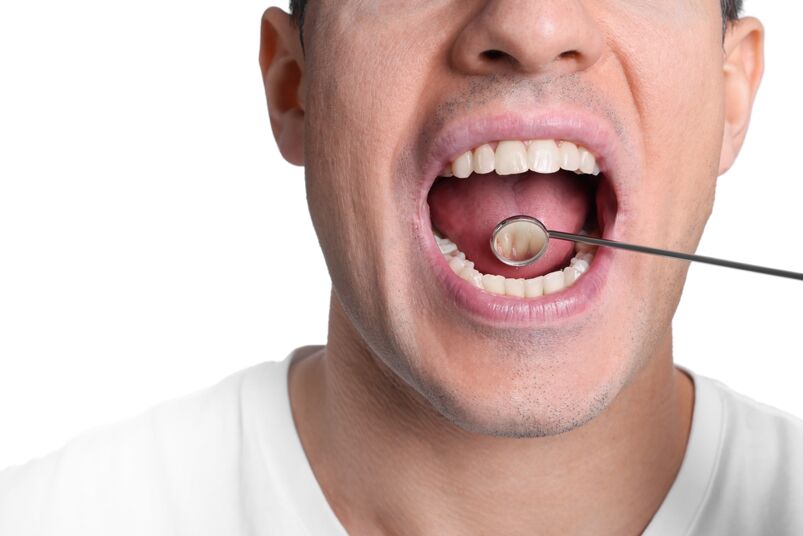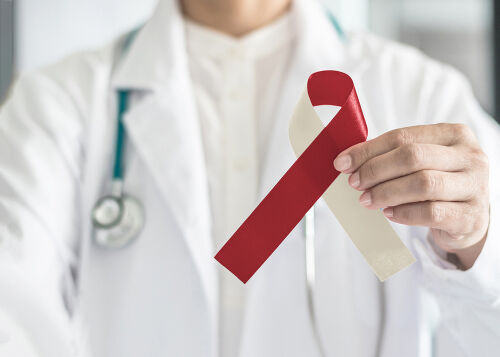
I have a cautionary tale to tell. I’m writing this from the hospital because of the tumor hemorrhaging blood down my throat. My husband and I have told doctors not to intubate me, so I’ve been told there is this freaky chance I could go at any time. This is my story.
Not-for-profit organizations such as the American Cancer Society spend a lot of money to get out messages about health care through pamphlets and news releases that work their way to the public. Then it ends up stacked on a rack in a wellness center, never to be seen again.
Growing up during the AIDS crisis and being HIV-positive myself, I was responsible for reading them.
So how could I be misdiagnosed by four doctors – two of them gay – for stage lV HPV-related oral cancer, a type of cancer affecting more people each year?
The answer is a mixed bag of no FDA-approved screening tools, limited research, and physician ignorance.
I’m no Michael Douglas. But I’m sharing my experience in the hopes I can help prevent others from receiving a diagnosis of an advanced HPV-related oral cancer being caught at a late stage when the prospects for survival have diminished to 60%.
For god knows…I asked all the right questions of my doctors throughout 2013 before receiving a correct diagnosis, and I still fight for my life.
HPV strain 16 causes most cases of oral and oropharyngeal cancers in America. (It also can cause anal cancer.) The virus is picked up during oral sex – mouth to penis, vagina or ass. Someone can pick it up in their 20s and have it go unnoticed for forty years until it’s caused lesions in the mouth. Oncologists also are treating more people in their 30s. Those who survive are left debilitated with a reconstructed tongue and pharynx, a permanent tracheotomy, and no longer able to speak or swallow. Yet, if caught in an early stage, it is a highly treatable cancer.
Doctors believe being co-infected with HIV complicates the ultimate prognosis for the patient – though researchers have yet to do the studies to back that theory up.
The onset of symptoms

Let’s go back to the beginning of my ordeal. In the winter of 2013, I noticed that when I coughed, I felt discomfort in a specific spot of my throat. It didn’t go away after three weeks, only becoming more persistent. I also started having mild earaches in my right ear. But I didn’t think much of it.
But, I did bring up the symptoms to my HIV specialist in March.
“Could this be cancer?” I asked. “I know being HIV positive, I’m at a higher risk for certain types of cancer.”
“I doubt it,” he replied. “You’re young and healthy.”
Then he gave me an STD check-up, which came back negative.
By May, the earaches on the right side of my head began to mess with my sleep. I used a heating pad and popped Ibuprofen to get me through each night. My throat felt like it had a tortilla chip caught in it.
I went to my gay dentist (these are doctors in Los Angeles, mind you) for a regular cleaning. Again, I told him about my symptoms existing only on the right side of my head and how they’d been getting worse.
Then I asked, “I have risk factors. Could it be cancer?”
“Nah! It’s TMJ. Temporomandibular Joint Disorder. You’re grinding your teeth at night. Let me fit you for an (nearly $1000 dollar) mouth guard.” He reassured me: “I have it too.”
I knew what TMJ was, and I knew I didn’t have TMJ. Still, I got the mouth guard and used it a couple of nights, but still no relief from the excruciating pain.
By July, I went to an ears, nose, and throat specialist I found in ZocDoc. In his office, I gave him the same rundown of symptoms, pointing out my HIV status and higher risk for cancer.
“Acid reflux,” he declared.
I’ve had acid reflux, and my problem was not acid reflux. I left his office disheartened.
In September, I was hardly able to sleep. When I could, I’d snore fierce enough for my husband to start kicking me to stop. And he was the one with the sleep apnea machine on this nightstand. Swallowing food got more challenging; the right side of my tongue felt like it was thickening, and my voice had started to change.
I tried another ENT in Beverly Hills I found on ZocDoc. On my first appointment, he said what a blessing ZocDoc had been to his practice, but I noticed how frazzled he seemed running from patient to patient.
Again, I listed the growing litany of symptoms, how long they’d been going for, and my risk factors.
I was sent home with an antibiotic prescription for a saliva gland infection and told to suck hard lemon candies to help dislodge any salivary cyst that might be present. I did as I was told, yet things kept getting worse.
Later that month, I returned to the same ENT, now presenting high fevers and other ailments.
He looked back over his notes. “So this all started in July.”
“No, in January.” Nine months earlier.
“Oh, I’d thought you said July.”
Damn, ZocDoc has a speedy workflow. (Not.)
“I’d like to set you up for a CT scan.”
The diagnosis and treatment
The October CT scan showed a mass at the base of the right side of my tongue. Then he did a biopsy where he found advanced cancer that had spread to my lymph nodes on the right side of my neck.
It was in December of ’13 that I began treatment with a combination of chemotherapy and radiation.
I was filled with rage. Not that I had cancer. That was no surprise. But how could it be that I understood that I was a high-risk person for HPV-related oral cancer when my doctors didn’t? Actor Michael Douglas was also misdiagnosed three times before his docs discovered his stage lV HPV oral cancer.
The answer is complex as to why HPV oral cancer gets diagnosed so frequently at an advanced stage.
Physicians and dentists need a screening tool. Currently, there is no FDA-approved test to diagnose HPV in the mouth or throat.
But doctors may also be unfamiliar with the symptoms of HPV-related oral cancer. Or they may be complacent. One of my doctors told me not enough is being done to educate medical and dental students about the rise of this cancer.
Another doctor told me, “If this can happen to you or Michael Douglas in major metropolitan communities, I shudder to think what’s happening in some place like Bakersfield.”
One UCLA researcher at a West Hollywood seminar on HPV cancers noted there’s very little data available on the prognosis for HIV-positive people with an HPV-16 co-infection. So doctors are in the dark when treating people with HIV.
HPV-related oral cancer symptoms include a persistent sore throat, earaches, hoarseness, enlarged lymph nodes, pain when swallowing, and unexplained weight loss. Oral HPV is three times more common in men than in women, according to the CDC.
The future

These days, I continue to fight for my life. I have persistent cancer, meaning neither chemotherapy, radiation, or surgery would bring it into remission. I’m in my second clinical trial— the Hail Mary passes for cancer — without hope if the trial fails. If it does, I will proceed with California’s new End of Life Option Act rather than let the cancer rot me away.
In 2013, I was six foot and a healthy 210 pounds. I had directed two successful documentaries and spent two decades as one of our community’s most active video journalists.
Now, I’m a tad over 150 pounds. I’ve retired from camera work and documentary filmmaking, too weak to carry a video camera. When I speak, it sounds like I suffered a stroke, so I can’t conduct interviews (or carry on a conversation in a noisy space). I no longer eat because of swallowing difficulties. All my liquid food is taken through a tube in my stomach – I no longer go out to eat with friends.
I want to live. This is all tearing up my husband as he watches me slipping away. I pray the experimental drug Opdivo starts shrinking my tumor. Yet, I also have to plan for the reality of it not working and how I wish to spend my remaining days. I prefer to die on my own terms, not drugged out on morphine, unrecognizable to my loved ones, waiting to drown in fluid build-up caused by pneumonia.
I’d rather not share all the gory details of how devastating this is. I hope my experience can help others. If you have any symptoms described above, please see your doctor or dentist if they last more than three weeks. Pamphlets and news reports are helpful, but you must advocate for your health with the medical community. That’s what I’ve learned the hard way.
Edit: Sadly, Mike Skiff passed away on November 22, 2016 only a few months after authoring this article. We’ve left the article as he wrote it in his memory and edited only for context. Rest in peace, Mike!
Mike Skiff was a documentary filmmaker and video journalist. His feature documentary, Kink Crusaders, premiered at the International Mr. Leather competition while Folsom Forever examined the history behind San Francisco’s Folsom Street Fair. He was in wonderful seventeen-year relationship with LA news anchor Tony McEwing.
Stay informed about critical health issues like HPV-related oral cancer and much more by subscribing to the Queerty newsletter, because knowledge is the best prevention!
Related:
Gay Twitter™ in shambles over misleading academic article linking oral sex to “throat cancer epidemic”
It may tough news to swallow. But there’s a few things that need cleared up…
Soldier charged in connection to gay sex tape scandal at Walter Reed Medical Center
Several tapes have emerged allegedly depicting the solider hooking up with various men inside the hospital.
Worrisome new study on HIV stigma finds Gen Z has a lot of work to do
GLAAD has published its annual report into HIV stigma and knowledge























Chris
WOW! What can one add, except that we need to push doctors to run the d**n tests!
CaliKyle
Insurance companies don’t like doctors who order tests. They routinely question the validity of medical testing and regularly refuse to cover them. The medical profession has become an industry like everything else in the US. Its all about enriching the insurance executives not about keeping people healthy and alive. The author told doctors repeatedly he thought he might have cancer yet none of them bothered to research his symptoms. Yes, ignorance and patient overload played a part but so did their unwillingness to order medical testing.
ErikO
Dentists can also diagnose oral cancer. I hope this man beats cancer.
Stache
Yes for those that think HIV is the only std to worry about. Although this one not much you can do but watch for any symptoms.
Masc Pride
@Stache: The HIV is likely playing a part in this as well, which Mike even addressed here. Cancers and secondary cancers are pretty common in poz people, and it further complicates both the HIV and the cancer(s). In most people who aren’t already immunosuppressed, HPV infections will go away without causing problems.
galatians328
Thanks to you and your partner for this brave and noble writing. We are glad to – at last- are in good care. Remember that many have confronted horrible diagnoses -including hundreds of thousands with cancers – who have achieved longer life, better quality of life, and for some remission of the disease.
‘Hidden’ within your writing is a clue to the upstream reason for this downstream result:
“Another doctor told me, “If this can happen to you or Michael Douglas in major metropolitan communities, I shudder to think what’s happening in some place like Bakersfield.”
There are several dysfunctional attitudes in this quote – the are likely not conscious in the doctor – that reveal a lot:
– the self-superior/self-deceptive attitude that people in ‘major metropolitan communities KNOW BEST’
– the abusive attitude that looks down on people NOT in major metropolitan communities
– the the ridiculously ignorant attitude of where people live and what they have and don’t have. After all, Bakersfield, at about 375,000 population, is a large city. This attitude doesn’t even consider what is going on with health care in actually small city, in town, in rural areas, in frontier communities.
Sadly, these three dysfunctional attitudes are widespread in many lgbt communities, lgbt media, lgbt leaders, etc.
And these dysfunctional attitudes help explain why so many lgbt people DON’T have access to even basic – not even advanced – best practices for their health care, dental care, social services care, etc.
Thanks for your noble and brave personal statement and public appeal. Those of us from the early days of AIDS know what it is like NOT to have tests, NOT to have proper diagnosis, NOT to have proper and timely referral to care, NOT to have access to state of the art, and high quality, resources.
The dysfunctional attitudes – above – have lead many lgbt to volunteer only with their community needs with little concern for others, lead many lgbt to keep resources only in major metros with large lgbt communities, lead many lgbt to disregard alarms and alerts and not care properly for their well being and the well being of others (so we still have spreading HIV and other STIs, we still have rampant addiction, we still have racial and other discrimination, etc …)
Stache
@Masc Pride: Cancer is not common with HIV positive people. How about instead we say they have a higher risk for certain types of cancer.
sfcarlos65
I’m happy that his story is being told. We must do every thing to educate ourselves.
Masc Pride
@Stache: But it is common. You have to factor in aging with the virus and how long a person has been on the chem therapies. Also, lots of people that have HIV are also infected with other cancer-causing viruses as well (HPV being one of them). Like I said, it wouldn’t present the same problem for a person who wasn’t already immunosuppressed.
Masc Pride
“Infection with HIV weakens the immune system and reduces the body’s ability to fight infections that may lead to cancer (2, 3). Many people infected with HIV are also infected with other viruses that cause certain cancers (2–8). The following are the most important of these cancer-related viruses:
Human herpesvirus 8 (HHV-8), also known as Kaposi sarcoma-associated herpesvirus (KSHV), is the cause of Kaposi sarcoma. Epstein Barr virus (EBV) causes some subtypes of non-Hodgkin and Hodgkin lymphoma. Human papillomavirus (HPV) causes cervical cancer and some types of anal, penile, vaginal, vulvar, and head and neck cancer. Hepatitis B virus (HBV) and hepatitis C virus (HCV) both can cause liver cancer.
Infection with most of these viruses is more common among people infected with HIV than among uninfected people.”
http://www.cancer.gov/about-cancer/causes-prevention/risk/infectious-agents/hiv-fact-sheet
hilllaguna
I started the Oral Cancer Foundation 15 years ago when I too was diagnosed with a stage 4, HPV16+ oral cancer. I was also missed by a bunch of different doctors from different training backgrounds causing my disease to become even more advanced while the process dragged on. Thing was in 1999 we didn’t know that HPV16 was causing these cancers, so even when I got treated at one of the best cancer centers in the US, they didn’t have a clue to the cause/etiology. I’m a “never smoker” which would have been the historic cause. Few gave me a snowball’s chance of making it with that late a discovery and diagnosis. But here I am today. I hope that the writer writer of this well done article also has my luck.
Frustrated with my experience, and having a medical-dental industry background, I have worked to change what is happening. Please take a moment to visit OCF at http://www.oralcancer.org and related to this particular aspect of the disease, these pages on HPV. http://www.oralcancerfoundation.org/hpv/ There is a lot of misinformation out there about the virus. OCF has sponsored much of the research that elucidates what we know about about HPV16 and oropharyngeal cancers, so the information on this part of our site can be trusted to be contemporaneous and accurate.
You cannot avoid this virus in your life; the CDC says that it is likely that 90% of the American population will have it in their lifetimes, as it is so ubiquitous. The good news is that only a small percentage of people that develop an oral/oropharyngeal infection with it have an immune system like mine that does not recognize it as a threat. The most important thing you can do is know the early warning signs yourself. Chance favors the informed mind. Once you have determined that you have PERSISTENT symptoms that you recognize, self refer to the appropriate doctor for biopsy and diagnosis. This disease can be very survivable IF it is found early.
Biff
@Masc Pride: Thank you for being part of the conversation, Stache. You are spot on that these newer cancers striking gay HIV positive men is about aging. This is especially true about cancers caused by a viral co-infection like the HPV-strain 16 & 18 cancers.
But I know of only one other gay man who’s had HPV oral cancer. When I go to the head and neck cancer support groups, it is made of of men mostly 50 or older who are HIV negative. So HIV status does not necessarily determine who will and who won’t get HPV related cancers, especially oral cancers.
Doctors treating gay men over 45 yo should keep a more watchful eye over these patients than those in the rest of their practice. Doctors treating HIV positive gay men should be proactive about examine for possible HPV related cancers.
As the HIV positive population lives longer, we are confronted with developing health concerns. It so saddened me that two of my doctors were gay and knew my HIV status and still misdiagnosed me – and certainly didn’t perceive me as at a greater risk for cancer.
Biff
@hilllaguna: I’ve been to your site many times over the years. It’s been a great resource to me. One thing I noticed is there doesn’t seem to be mention about HPV and HIV co-infections. Sites like the CDC’s may mention “immuno=suppressed individuals” but immune suppression can come from non-viral causes, like chemo treatments.
Should there be more data that looks at viral co-infections on the longterm prognosis and best treatment options for people with both HPV and HIV?
Antidotally, doctors I’ve spoken with have said that people with HIV don’t seem to do as was well. The patients whom my oncologist and radiologist have lost to HPV oropharyngeal cancer have been HIV positive men. At a seminar I attended about HPV anal cancer said there are indications that HIV even changes the nature of the disease beyond how well the immune system is able to fight back. That the cancer may even be a little different when a co-infection is present.
Is the Oral Cancer Foundation satisfied that the current information it carries is enough for people with HPV and HIV co-infections? Or is this an important subject behind the times in acquiring medical data?
Stache
@Biff: Yeah, seems there’s allot we don’t know. I hear the “immune suppressed” but exactly where is it coming from. Was it there before or from the cancer treatment itself.
If you’re undetectable or close to your immune system should be fine and not suppressed. Although, I did read that doing the Haart itself can effect the functionality of the immune system to some degree.
Masc Pride
@Biff: I wasn’t saying HIV- people can’t get oral cancer. I said that these cancer-causing viruses are more common in HIV+ people, which is also stated in the cancer.gov info. As HIV+ people age with the virus, the virus will obviously start to compromise the health of those individuals at some point. This is where the cancers come in, especially since a lot of poz people already have the viruses that can lead to certain forms of cancer.
hilllaguna
Biff – The data on immune suppression is about the same regardless of origin. The CDC data is primarily drawn from organ transplant patients that are on suppressant drugs. Chemo marginally immune suppresses (depending on type degree varies), but not with the weight of HIV nor Rx immuno suppressants given for other reasons. And treatment for a late find oral cancer is likely going to involve chemo as part of the solution. Eliminating chemo from the solution is totally doable in early finds and in particular in HPV+ oropharyngeal cancers which respond particularly well to radiation alone. HPV patients enjoy a 30% survival advantage even as late stage finds because of this. That subset of the disease is where we see our best outcomes, and tobacco origin cancers where we see some of the worst. There is a third reason that people come to this (about 7% of all patients) that we have no idea why they get it as the are HPV- and non smokers. They are mostly young women, they get tongue cancers that respond poorly to treatments, the disease runs very fast, with poor long-term outcomes. Whatever that cause is, a common lifestyle issue, genetic predisposition or ?, is not understood at all. The need for early discovery is acute for many reasons.
The treatment option issue in oral cancers is limited, and there are only a few choices today, most of them old school like radiation chemo and surgery. You are going to get the same regiment to stay alive regardless of HIV status. It’s all we have that works. In ten years perhaps the immune checkpoint inhibitors and other therapies that get your own immune system back in the game might be a bigger player, but how those impact HIV + patients is a total unknown at this point as they are pretty new in the general population in the last 6 months. Sub populations usually are not looked at until the science is in looking at the largest population first.
While positive HIV status has negative connotations for many diseases and the treatments they involve, I do not think this one to be weighted any differently. And as I stated above, 99% of all people that develop an oral HPV infection – which 90% of the US population is going to become exposed to – will develop an immune response to the infection and clear it without ever knowing that they had it as it has no noticeable symptoms. The other .9% like me will progress on to develop a cancer related to it. This less than one percent does not seem to be weighted towards individuals that are HIV positive, or compromised in any other way other than having a likely inherited genetic frailty/predisposition for this to occur, for which they can thank their grandparents not their sexual partners. Those that serio convert to an HPV antibody, which is about everyone, will get the virus and have their immune system defeat it many times in their lives. As to some of the concerns expressed above, the NHANES study which is ongoing in the US nationally, tells us that on any given day 26 million Americans have an oral HPV infection. Last year we had somewhere between 12-15 thousand develop an HPV etiology oropharyngeal cancer in the US. So while not zero, relative risk is low. The vast majority of those people will survive their cancer if they get into treatments early. I would expect that the very few of those that are HIV positive will have poorer outcomes than HIV- people as is the case in other catastrophic diseases that involve highly damaging treatments.
I am particularly interested in al this, and I have pushed for OCF to spend money on this research since the early days of the organization. The work of Dr. Maura Gillison, at Johns Hopkins and now at Ohio has looked to some degree at HIV patient subpopulations, but not in depth. Googling it with her name will certainly bring up more science papers that we have not included on our site. A recent event has had me thinking about all this. I just got back from a volunteer trip as part of a surgical team in Africa. We did a lot of neck surgeries each day under some difficult conditions and for long hours. About half the patients we worked on were HIV+ Very late on one day I got a needle stick through my gloves while deep in the surgical field and blood. When everyone is exhausted from long days, shit happens. So now I am being tested monthly and on a course of antivirals. I’ll know somewhere down the road if I am Hep or HIV+. I am not concerned about my HPV status in relationship to this, as there is no evidence that it is additive.
Ian
WOW!
This makes me appreciate what I’ve been known to annoy my in-house Drs about, when patients or their family have concerns or nagging worries I can’t confidently explain to them. (I’m a well educated and intuitive nurse in a small hospital where our floor isn’t specialized – we get everyone of every age with all problems that we aren’t too small to handle up front, so my experience is broad).
I’m praying for you two, I hope you’re still around with a quality of life that is worth it…. I want that for you both.
But understand also, that your article has done some good. Not just for those with HPV-16 infections, but for anyone who ever is my patient and feels it in their gut that something is being missed.
I’ve been beginning to question myself (am I a hypochondriac on the behalf of my patients? Is it really worth it for me to constantly be the nurse who brings odd concerns to the house Dr when they don’t seem to be related to the problem they are here for? am I just getting sucked in to the anxieties of my patients?).
Because the MDs don’t always listen to me, or they tell me its nothing to worry about, or it should be something they take up with their primary MD because it’s not part of their hospital case & they can’t treat it… and also because I never hear the outcomes of these patients who come in, and then disappear from my radar forever.
I’m feeling reaffirmed in my practice of using my assessment skills and advising patients of how to get the most effective attention regarding their problems. What to say to and focus on to their Drs, what to draw particular attention to, to assure they get the diagnostics they need, etc. Your article is helping me to make sure I keep this up and don’t become jaded. I’ll keep you in mind next time I doubt myself when advocating on their behalf.
If you lose this wrestle, please- you and your husband should know that I appreciated you telling your story, and that I am in a position to at least help more than just myself with your story. I’m reaffirmed in my practice.
Best of love to both of you. Stay strong. heartfelt kisses & loves.